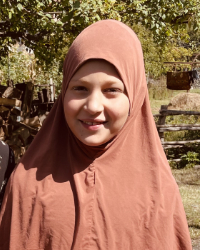Kist in Georgia

Photo Source:
manothegreek
|
Send Joshua Project a map of this people group.
|
| People Name: | Kist |
| Country: | Georgia |
| 10/40 Window: | No |
| Population: | 10,000 |
| World Population: | 10,700 |
| Primary Language: | Chechen |
| Primary Religion: | Islam |
| Christian Adherents: | 0.20 % |
| Evangelicals: | 0.20 % |
| Scripture: | Complete Bible |
| Ministry Resources: | Yes |
| Jesus Film: | Yes |
| Audio Recordings: | Yes |
| People Cluster: | Caucasus |
| Affinity Bloc: | Eurasian Peoples |
| Progress Level: |
|
Introduction / History
Kist people belong to the larger Caucasian ethnic group called Vainakh; just like the Chechens from Chechnya and the Ingush from Ingushetia. All three peoples, Chechens, Ingush and Kists, share similar cultural features. The term "Kists" refers to ethnic Chechens who came from Chechnya to settle in Pankisi Gorge in the 18th century. It is the name that the Georgians originally gave them. The Kists have now become Georgian citizens; they bear Georgian surnames and speak Georgian and Chechen.
The Kist community remains small and are scattered across northeast Georgia, Pankisi Gorge and some adjoining lands of the provinces of Tusheti and Kakheti. Currently there are six Kist villages in Pankisi: Duisi, Dzibakhevi, Jokolo, Shua Khalatsani, Omalo (different from the village of Omalo in Tusheti), and Birkiani. A smaller number are in Russia.
What Are Their Lives Like?
The Kist community in Georgia managed to preserve its original Chechen dialect, culture and traditions. Most members of the community are bicultural and bilingual, and a large number have also lived in Chechnya at some point. Kist people are mountaineers. They are proud people, honest and fair, with a hard, austere cold character. They don't like expressing their feelings. They know the value of friendship; they are even able to give their life for the other if they are a true friend. They are also very hospitable, and they respect their elders and traditions. Throughout time and until now, traditions like hospitality, friendship, mutual help and blood feud have remained. Kist people are proud to show how they can still respect them while coping with modernity and the changes which come along.
What Are Their Beliefs?
The Kist people in Georgia are Sunni Muslims who believe that the supreme God, Allah, spoke through his prophet, Mohammed, and taught mankind how to live a righteous life through the Koran and the Hadith. To live a righteous life, you must utter the Shahada (a statement of faith), pray five times a day facing Mecca, fast from sunup to sundown during the month of Ramadan, give alms to the poor, and make a pilgrimage to Mecca if you have the means. Muslims are prohibited from drinking alcohol, eating pork, gambling, stealing, slandering and making idols. They gather for corporate prayer on Friday afternoons at a mosque, their place of worship.
The two main holidays for Sunni Muslims are Eid al Fitr, the breaking of the monthly fast and Eid al Adha, the celebration of Abraham's willingness to sacrifice his son to Allah.
Sunni religious practices are staid and simple. They believe that Allah has pre-determined our fates; they minimize free will.
In most of the Muslim world, people depend on the spirit world for their daily needs since they regard Allah as too distant. Allah may determine their eternal salvation, but the spirits determine how well we live in our daily lives. For that reason, they must appease the spirits. They often use charms and amulets to help them with spiritual forces.
What Are Their Needs?
The Kist people in Georgia need a John 10:10 blessing: The abundant life Jesus offers those who are willing to submit to his lordship.
Prayer Points
Pray for spiritual discernment and a hunger for true spirituality.
Pray for the Kist culture to be renewed and enhanced by a work of the Holy Spirit and shaped into a God-centered and God-honoring mold.
Pray for the Holy Spirit to move among their family and community leaders to seek his face and enjoy his blessings.
Pray for the Lord to thrust out workers who will nurture disciple Kist disciples who will make more disciples.
Pray that soon the Kist people will have faith that will lead them to live honorable lives that will draw others to the savior.